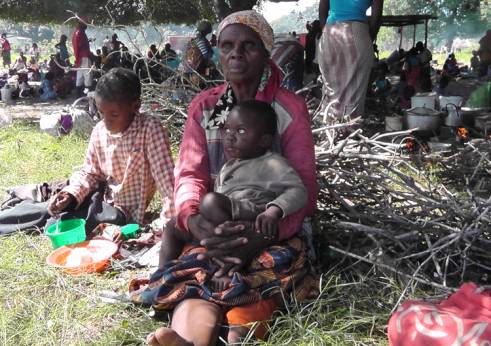By Sarah Marzouk
Heavy rains which hit southern and central Mozambique in January have affected over 150,000 people, flooding farmland and pastures, damaging houses, roads, drainage systems and electricity supplies. Five major rivers in the region, including the Zambeze and Limpopo remain above their alert levels and heavy rain continues to fall.

On 23 January, the city of Chokwe in the south of the country was evacuated, with water levels of over a metre in the city. As a result, at least 70,000 people fled to higher ground in Chiaquelane and Hokwe, about 30 kilometres from the city.
The most recent information from the Government is that 138,000 people in Gaza province are now living in temporary accommodation centres.
Communities cut off by heavy rain
Many up-river communities west of Chokwe were also cut off due to the flooding, including several communities with older people’s associations that have worked with our Affiliate, Vukoxa. The estimated number of older people affected by the emergency in Chokwe district is over 4,500.
Janet Duffield, HelpAge International’s Country Director in Mozambique said of the situation: “Many older people in rural farming communities have been isolated from services or external support and have lost their crops and animals. These communities are now being provided with some food rations, such as rice and beans.
“Older people in accommodation centres are also extremely vulnerable due to overcrowding, lack of shelter, fresh water and sanitation and other issues such as violence and theft.”
How HelpAge is responding to older people’s needs
We are now responding to the floods in Chokwe District, Gaza Province, by:
- conducting advocacy work to ensure older people and other vulnerable groups affected by the emergency are included in the initial humanitarian response,
- supporting our Affiliate Vukoxa to carry out a full assessment of older people’s immediate needs,
- responding in Chokwe district both in the accommodation centres and isolated communities to support 2,000 older people and their families, identifying the most vulnerable and linking them to services.
Once the water recedes, our work will concentrate on providing older people with seeds and tools to help them recover from losing their crops and farmlands, as well as supporting the rebuilding and reparations of boreholes, latrines and houses.
Where older people are in accommodation centres we are working to ensure that they are included in centre management and work with activists so they can access necessary services, like water and food, and are adequately protected.
